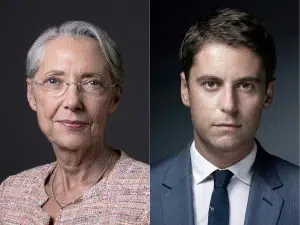Brussels – New year, new government in France: After yesterday’s (January 8) resignation of Prime Minister Elisabeth Borne, President Emmanuel Macron appointed the new head of government, former Education Minister Gabriel Attal, this morning. In the past days, it was obvious that there would be this changing of the guard, considering the President’s twofold attempt to give his second presidential term a new impetus on the domestic policy front and to push his party (and the entire liberal Renew Europe coalition) ahead in the early June European Parliament elections.

Attal served in the ranks of the Socialist Party early in his political career before following President Macron to his Renaissance Party. The 34-year-old politician has already held several prominent political roles, including spokesman for the government led by Jean Castex (2020-2022) and minister of Public Accounts (2022-2023) and of Education (from July 2023) in the Borne government. With today’s nomination, he becomes the youngest prime minister of the Fifth Republic. The new premier takes office after President Macron accepted Borne’s resignation yesterday evening: an announcement that was not particularly surprising since the cabinet reshuffle option has been in the cards for weeks, at least since the passing of the immigration law. “Her work in the service of our nation has been exemplary every day she carried out our project with the courage, commitment, and determination of the women of state,” Macron said of the resigning prime minister.

Former French prime minister, Élisabeth Borne, at the European Parliament’s plenary session (Nov. 22, 2022)
“I think Borne did a positive and extremely complex job because she carried out two important and difficult reforms, one on pensions and the other on immigration law,” the Secretary General of the European Democratic Party (EDP) and Renew Europe MEP, Sandro Gozi told Eunews speaking of “the end of a phase, I understand the decision of president” Macron: “To launch a new phase you need a new government team.” According to Gozi, “it is good to do it in January” and not wait for the outcome of the European elections or the Olympic Games in the summer “because it is now that the new political phase begins.” Speaking of the new government ready to take office, Gozi hopes it will give “the boost for the remaining half of the presidential term” and “an impetus to the election campaign” for the renewal of the EU Parliament in June. “European elections are very important for Macron, the most pro-European leader in Europe,” the EDP secretary general confirmed.

From left: former French prime minister, Élisabeth Borne, and her successor, Gabriel Attal (credits: Joel Saget / Afp)
According to French law, the prime minister has a coordinating role in government action, while the political direction is the prerogative of the president of the Republic. After Borne’s resignation, the leftist La France Insoumise party demanded that the new prime minister submit to a vote of confidence by the National Assembly, even if this is not a mandatory step in France. Should there be no vote of confidence, Jean-Luc Mélenchon‘s party threatened to file a motion of censure, which requires the signature of one-tenth of the deputies (58). The task of the new Prime Minister Attal will be to achieve President Macron’s goal of “industrial, economic, European and civic rearmament” ahead of June’s European elections.
English version by the Translation Service of Withub





